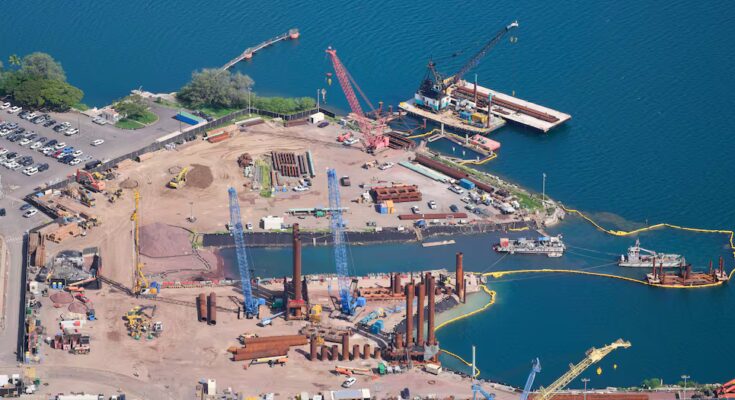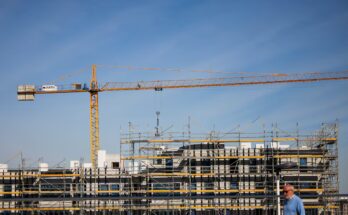Last week, hundreds of employees of Turner, the U.S. subsidiary of ACS, gathered at Nissan Stadium in Nashville for one of those huge annual conventions that big companies usually hold. Participants were able to explore new work tools, such as a protocol that standardizes management and reduces human improvisation, a platform that automates the progress of a project by eliminating manual steps; autonomous drones or solutions that help review the endless contracts of a project in clear language.
The meeting could be a metaphor for how technology – and the North American country – are changing the Spanish construction giant. In the United States, thanks to its subsidiaries, mainly the Turner company and the civil engineering company Flatiron Dragados, ACS already achieves a turnover of over 20 billion euros (57% of sales). Nearly 30% of the profit comes from Turner alone.
It’s difficult to keep track of the jobs awarded: a few days ago it was the turn of a new hospital in Memphis for 1,000 million dollars (850 million euros) and before that the new terminal at San Diego airport was inaugurated, the first phase of a 3,000 million project that began in 2021. ACS’s global order book, of 89,000 million, continues at high levels (15,300 million were added in the second half) and the group The company chaired by Florentino Pérez continues to be very active in the concessions branch (through Iridium and its 50% stake in Abertis) and in construction activity in Australia with the subsidiary Cimic. For comparison, the contracts he carries in his backpack are equivalent to 5% of Spain’s GDP.
But there are a couple of new elements to its strategy, and those are jobs related to defense and data centers. Betting is not risk-free. Bank of America (BofA) analyzes in its latest report on the company that, in addition to building data centers for external customers (especially through Turner), it outlines plans to finance and develop 2.1 GW facilities of its own capacity. “This is a newly created business line that, in principle, should resemble investments in infrastructure concessions or real estate projects, which would allow the group to deploy its expertise throughout the entire project life cycle (tender, design, financing, construction and management).” The company leans towards a model of developing and marketing these assets and then selling them as happens, for example, in the renewable energy sector with wind or solar parks: “The risk profile of this activity seems high, since the concept is not yet fully proven, but the returns could be interesting, subject to execution”, they judge at BofA.
Attilio Rivetti, vice president of Turner, spoke in the latest communication to shareholders that data centers and industrial projects are the main drivers of demand. From ACS they point out that this transformation is transforming it from a construction company to a co-developer. “In the United States, our subsidiary Turner is one of the top five builders of large-scale data centers, with more than $28 billion (€26 billion) executed and approximately one-third of its order book concentrated in this rapidly growing sector.” Flatiron Dragados completes the activity with the civil works and infrastructure these structures require. Among the most recent, five centers are being built in Texas for 60 million and another in Maryland for 100 million dollars.
Nicolás del Río, analyst at Activotrade, highlights the flexibility of the group: “It has such amazing contracts ranging from the construction of a dry dock in the naval base of Pearl Harbor (Hawaii) for the US Navy, to the construction of a data center for the technology giant Meta, in the “State of Louisiana”, and believes that the recent acquisition of defense-related orders “adds a structural growth path that can offer a unique opportunity for the company”.
war drums
The war drums sound in the scales. The group is asking for contracts in the United States, Europe and Australia for over 50 billion euros, from the new buildings of the military academy at West Point (New York) to the tenders prepared by the Army Corps of Engineers (63 billion dollars this year); those of the US Army Corps of Engineers (20 billion) or the 17 billion available to the Air Force Civil Engineer Center.
In this sector, they explain to ACS, Turner has already completed defense and public security projects in the last decade worth over 9 billion euros, more or less 10% of its order book, valued at 34,400 million euros. It currently performs more than $3,442 million in work for the federal government and the Department of Defense. For its part, Flatiron was selected to be part of a program called C2E Matoc worth almost 13 billion euros, one of the largest in the history of the US Department of Defense.
If ACS consolidates this positioning, it will not only increase its revenue in the United States, says Del Río, “but it can also become a key player in the infrastructure sector in the United States, as long as President Donald Trump does not boycott its projects with the tariff pressure we are used to.” Tariff measures and immigration restrictions also have negative consequences on the sector in the form of inflation. The internal index prepared by Turner, which measures the construction costs of non-residential buildings in the United States based on wage costs, material prices or market competitiveness, grew by 4.19% in the last quarter compared to 2024.



